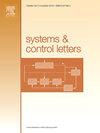不确定级联双曲pde - ode的自适应边界估计
IF 2.5
3区 计算机科学
Q3 AUTOMATION & CONTROL SYSTEMS
引用次数: 0
摘要
研究了一类常微分方程与双曲型偏微分方程级联的自适应边界估计问题。级联系统由n×n耦合双曲偏微分方程组成,该系统受域内参数不确定的约束,偏微分方程通过偏微分方程的左边界进入偏微分方程。设计了自适应边界观测器来估计系统状态和未知参数。为了便于观测器的设计,通过Volterra积分变换和状态变换将观测器误差系统转化为目标系统,并结合最小二乘法和可变遗忘因子提出了一种交换滤波器设计方法。稳定性分析表明,在持续激励条件下,滤波器的状态估计误差和参数估计误差都具有指数收敛性。最后,将所得理论结果应用于考虑域内松弛时间和边界通量波动不确定性的线性化的ar - rascle - zhang (ARZ)交通流模型,验证了该方法的有效性。本文章由计算机程序翻译,如有差异,请以英文原文为准。
Adaptive boundary estimation for uncertain cascaded hyperbolic PDE-ODEs
The paper is concerned with the adaptive boundary estimation problem for a class of hyperbolic partial differential equations (PDEs) cascaded with a set of ordinary differential equations (ODEs). The cascade system consists of coupled hyperbolic PDEs, subject to uncertain parameters in domain and the ODEs entering the PDEs through the left boundary of the PDEs. The adaptive boundary observer is designed to estimate the system state and the unknown parameters. In order to facilitate the design of the observer, the observer error system is transformed into a target system by a Volterra integral transformation and a state transformation, and then a swapping filter design method is proposed by combining the method of least-squares with a variable forgetting factor. The stability analysis shows the exponential convergence of both the state estimation error and the parameter estimation error under the persistent excitation condition of the filter. Finally, the obtained theoretical results are applied to the linearized Aw–Rascle–Zhang (ARZ) traffic flow model involving the in-domain relaxation time and the boundary flux fluctuation uncertainties, which verifies the effectiveness of the proposed method.
求助全文
通过发布文献求助,成功后即可免费获取论文全文。
去求助
来源期刊

Systems & Control Letters
工程技术-运筹学与管理科学
CiteScore
4.60
自引率
3.80%
发文量
144
审稿时长
6 months
期刊介绍:
Founded in 1981 by two of the pre-eminent control theorists, Roger Brockett and Jan Willems, Systems & Control Letters is one of the leading journals in the field of control theory. The aim of the journal is to allow dissemination of relatively concise but highly original contributions whose high initial quality enables a relatively rapid review process. All aspects of the fields of systems and control are covered, especially mathematically-oriented and theoretical papers that have a clear relevance to engineering, physical and biological sciences, and even economics. Application-oriented papers with sophisticated and rigorous mathematical elements are also welcome.
 求助内容:
求助内容: 应助结果提醒方式:
应助结果提醒方式:


